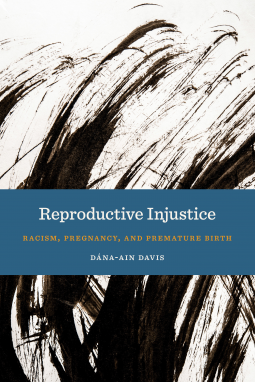
Reproductive Injustice
Racism, Pregnancy, and Premature Birth
by Dána-Ain Davis
This title was previously available on NetGalley and is now archived.
Send NetGalley books directly to your Kindle or Kindle app
1
To read on a Kindle or Kindle app, please add kindle@netgalley.com as an approved email address to receive files in your Amazon account. Click here for step-by-step instructions.
2
Also find your Kindle email address within your Amazon account, and enter it here.
Pub Date Jun 25 2019 | Archive Date Oct 03 2019
Talking about this book? Use #ReproductiveInjustice #NetGalley. More hashtag tips!
Description
Winner, 2020 Senior Book Prize, given by the Association of Feminist Anthropology
Winner, 2020 Eileen Basker Memorial Prize, given by the Society for Medical Anthropology
Honorable Mention, 2020 Victor Turner Prize in Ethnographic Writing, given by the Society for Humanistic Anthropology
Finalist, 2020 PROSE Award in the Sociology, Anthropology and Criminology category, given by the Association of American Publishers
A troubling study of the role that medical racism plays in the lives of Black women who have given birth to premature and low birth weight infants
Black women have higher rates of premature birth than other women in America. This cannot be simply explained by economic factors, with poorer women lacking resources or access to care. Even professional, middle-class Black women are at a much higher risk of premature birth than low-income white women in the United States. Dána-Ain Davis looks into this phenomenon, placing racial differences in birth outcomes into a historical context, revealing that ideas about reproduction and race today have been influenced by the legacy of ideas which developed during the era of slavery.
While poor and low-income Black women are often the “mascots” of premature birth outcomes, this book focuses on professional Black women, who are just as likely to give birth prematurely. Drawing on an impressive array of interviews with nearly fifty mothers, fathers, neonatologists, nurses, midwives, and reproductive justice advocates, Dána-Ain Davis argues that events leading up to an infant’s arrival in a neonatal intensive care unit (NICU), and the parents’ experiences while they are in the NICU, reveal subtle but pernicious forms of racism that confound the perceived class dynamics that are frequently understood to be a central factor of premature birth.
The book argues not only that medical racism persists and must be considered when examining adverse outcomes—as well as upsetting experiences for parents—but also that NICUs and life-saving technologies should not be the only strategies for improving the outcomes for Black pregnant women and their babies. Davis makes the case for other avenues, such as community-based birthing projects, doulas, and midwives, that support women during pregnancy and labor are just as important and effective in avoiding premature births and mortality.
Available Editions
| EDITION | Other Format |
| ISBN | 9781479853571 |
| PRICE | $36.00 (USD) |
| PAGES | 272 |
Readers who liked this book also liked:
Tanis Allen, LMSW, ACSW
Health, Mind & Body, Self-Help





